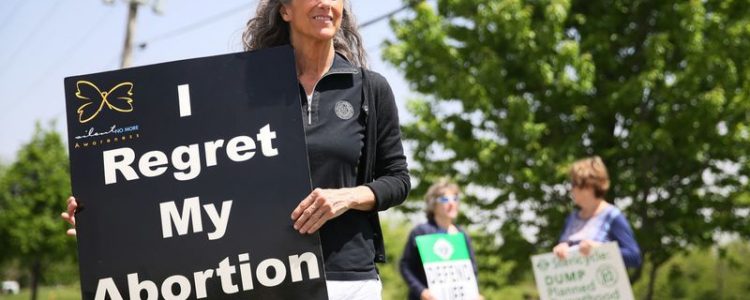
The following article is a synopsis of an episode from our Life Chat Podcast series. To listen to the full episode, click here.
Could someone still be mourning a decision they made thirty-plus years earlier? Could it have such an impact that they decide to devote their life to spreading how evil, horrible, and degrading it is? Such is Nancy Kreuzer’s story. Nancy Kreuzer had a second trimester abortion in the 1990s and now travels around Illinois to share her story with women, men, and anyone willing listen, in the hopes that she can change their mind or help them find healing.
Kreuzer is a member of Silent No More, an organization that gives a voice to women who had an abortion and regret it. Nancy’s story is unique, as are all the women’s stories: unique and different in their own ways, but very much the same in the ways that abortion has caused all these women unutterable grief and misfortune in multiple aspects of their lives.
Kreuzer was 5 ½ months pregnant when she went to the doctor for an ultrasound. She had been receiving wonderful care up until then, but she said that at the moment of the ultrasound, when the doctor excused himself for a second, she felt everything change. She explains, “There was this distortion of language… the kind of care my baby and I had been receiving up until that time was drastically changing.” The doctor told her that there were many problems with the baby inside of her, including down syndrome and water on the brain, and after those words, he ceased calling it a baby.
Instead, the doctor was now referring to the baby as a “clump of cells” or a “fetus” that “needed to be removed.” “I never did question his advice, I never asked what a second trimester abortion would mean for me or my baby,” Kreuzer comments. She took his advice to get an abortion and went through with it, only to realize in the following months, years, and decades what a devastating choice that was.
In the days and weeks that followed, Kreuzer remembers being sort of numb, but also experiencing strange feelings and wondering about the fact that, after an abortion, “There’s no body to bury, there’s no doll-sized casket, there’s no funeral.” She said that her family who had been excited about the pregnancy simply ceased talking about it. It was like it had never happened in the first place. She didn’t talk about it with anyone, she explains, but instead kept it all inside her.
“Very quickly, very soon after the abortion, I began to feel the side affects of the abortion, but I didn’t recognize them.” Kreuzer laments. “What I did for so many years was to just bury my emotions, set my jaw, and keep going.”
This is what many women do: they refuse to think about what happened, what they did. They continue with their life as if nothing had happened, but the guilt and hurt is eating away at them. She said that in the years to come, when she had another child, she would get flashbacks to the abortion, she couldn’t stand to hear her child cry, and the pain was almost unbearable.
Finally, about 10 years later, she had a conversion. It came seemingly out of nowhere, Kreuzer accounts, but one day she felt the sudden urge to google a second trimester abortion. She said it was so difficult, and she almost didn’t do it, but she felt God pushing her to do it. Once she discovered the truth, she was even more devastated at what she had done. “I didn’t know that there would be a day when I would ask myself how I could have allowed this to be done,” Kreuzer mourns, but after a lot of prayer and a conversion back to God, “I was free and set free from an abortion that had enslaved me in mind, body, and soul for decades.”
Mary Kate Knorr asked Kreuzer in the interview if she had ever gotten any pushback on her story. Kreuzer shared an enlightening fact that rarely, if ever, does she get pushback on the testimony itself. “There’s been no pushback… that’s the beauty, I think, of testimony,” she explains. Because her story is so personal to herself, there’s not much there that people can argue with. However, “If it was to evolve into a conversation about when life begins, a woman’s right to choose, there’s been pushback,” she admits. She does say, though, that no matter what, she tries to divert the conversation back to her own story, to the facts of what she went through and not the emotions or scenarios that could occur.
One of the most powerful tools to combat abortion in our country is the power of testimony, and as a group, Silent No More is doing a wonderful job with this. The more women share their story, the more women that are affected by this, the more the truth of the horror and shame of abortion will be widespread and well-known.
